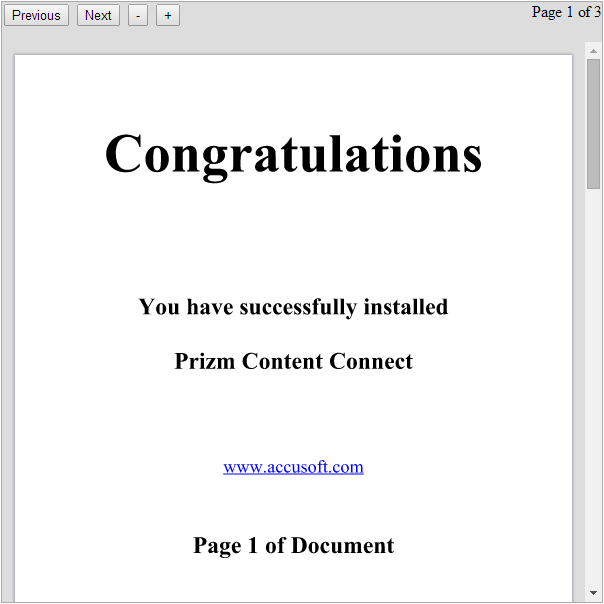

| Working with PrizmDoc > Developer Guide > Customizing the Viewing Client > Customization Examples > Building a Custom User Interface |
It is possible to build a custom Viewing Client UI by directly embedding the ViewerControl instead of embedding the Viewing Client using the jQuery plugin.
There are several benefits to building a custom Viewing Client UI, including the ability to:
In the example below, the ViewerControl is embedded into a page and a simple UI is built around the ViewerControl. The Viewing Client created by the example code is shown in the figure below:

The directory structure for this example is:
 |
This example uses jQuery for simplicity and because it is well known to many readers. jQuery is served from the Google Hosted Libraries CDN. |
| HTML (simple.html) |
Copy Code
|
|---|---|
<!DOCTYPE html> <html> <head lang="en"> <meta charset="UTF-8"> <title>Custom Viewer UI Example</title> <!--resources for the viewer--> <link rel="stylesheet" href="css/viewercontrol.css"> <script src="js/viewercontrol.js"></script> <!--Use jQuery to build the UI of the viewer--> <script src="//ajax.googleapis.com/ajax/libs/jquery/1.10.2/jquery.min.js"></script> <!-- Script tag for simple.js, which creates and embeds the custom viewer. --> <script src="js/simple.js"></script> <!-- CSS for the page --> <link rel="stylesheet" href="css/simple.css"> </head> <body> <!-- This div contains the custom viewer and UI elements. --> <div class="viewerWrapper"> <!-- There are some buttons/tools in the viewer UI. These will be disabled until the ViewerReady event. --> <button id="prevPage" class="viewerButton" disabled>Previous</button> <button id="nextPage" class="viewerButton" disabled>Next</button> <button id="zoomOut" class="viewerButton" disabled>-</button> <button id="zoomIn" class="viewerButton" disabled>+</button> <!-- There is a status bar that shows the current and total page number. --> <div class="floatRight">Page <span id="currentPage">1</span> of <span id="totalPages">1</span></div> <!-- The ViewerControl is embedded in this element. --> <div id="viewerControlContainer">ViewerControl goes here</div> </div> </body> </html> |
|
| JavaScript (js/simple.js) |
Copy Code
|
|---|---|
$(document).ready(function() { // Get the element where the viewer will be embedded. var element = document.getElementById("viewerControlContainer"); // Create the options object for the viewer var options = { documentID : "a_valid_document_id", imageHandlerUrl: "pcc.ashx", // printTemplate : "..." // include a print template for printing to work }; // Create the viewer control var viewerControl = new PCCViewer.ViewerControl(element, options); // It's best practice to wait for the "ViewerReady" event before calling the viewer API. viewerControl.on("ViewerReady", function() { // Display the page count when the estimated and actual page count are available. viewerControl.on("PageCountReady", displayPageCount); viewerControl.on("EstimatedPageCountReady", displayPageCount); function displayPageCount(ev) { $("#totalPages").html(ev.pageCount); } // Display the current page number when the page changes. viewerControl.on("PageChanged", function(ev) { $("#currentPage").html(ev.pageNumber); }); // It's safe to enable the UI buttons during the ViewerReady event $(".viewerButton").prop("disabled", false); // ...and then hookup the UI buttons $("#nextPage").click(function() { viewerControl.changeToNextPage(); }); $("#prevPage").click(function() { viewerControl.changeToPrevPage(); }); $("#zoomOut").click(function() { viewerControl.zoomOut(1.25); // Zoom out 1.25x }); $("#zoomIn").click(function() { viewerControl.zoomIn(1.25); // Zoom in 1.25x }); }); }); |
|
 |
The sample code that installs with the product demonstrates how to generate a document ID. The code is too large to be shown in this example. |
| CSS (css/simple.css) |
Copy Code
|
|---|---|
.viewerWrapper { width: 600px; height: 600px; position: relative; border: 1px solid #aaa; background: #ddd; } #viewerControlContainer { position: absolute; top: 40px; bottom: 0px; left: 0px; right: 0px; } .floatRight { float: right } |
|